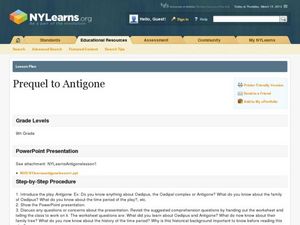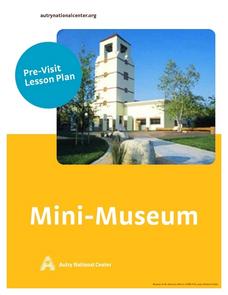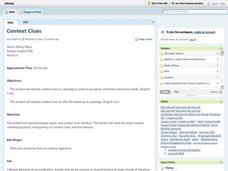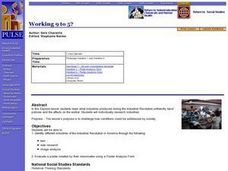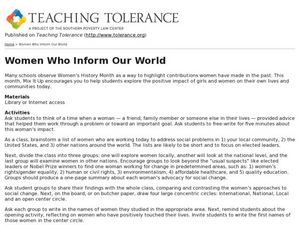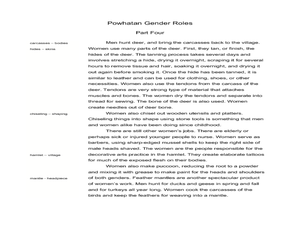Smithsonian Institution
Changing Gender Roles on the Home Front
Many historians discuss how gender roles changed because of World War II, but how did this come to be? An informative resource challenges scholars to do some digging and research the information for themselves. They research how...
Curated OER
Prequel to Antigone
Trying to find a way to begin your Antigone unit? Use this lesson plan to introduce your class to the background of Oedipus and Antigone, as well as the historical context. They view a PowerPoint presentation about Oedipus and the story...
Curated OER
Lesson 1: Faulkner's The Sound and the Fury
I love Faulkner, his experimental style and stream of consciousness are so exciting. Your learners can analyze William Faulkner and his novel, The Sound and the Fury by defining his place in American literary history and exploring his...
Curated OER
Stories of the American Experience
Students identify a veteran to interview. This could be a family member of one of students or someone contacted through an organization in the community. They use a storyboard to plan their movie about their subject.
Curated OER
Create a Holiday for Your Favorite Hero
Students create a holiday for a hero. The person may be someone in history who is not currently honored with a holiday, another famous person, a family member, a friend, or someone else they admire.
Curated OER
Mini Museum
Students brainstorm about the different types of museums and complete a worksheet by looking at artifacts and what they think that object did. They work together in groups to complete a KWL chart throughout the activity.
Curated OER
Context Clues
Work on context clues with your ninth graders in this lesson, which focuses on identifying and analyzing clues to define unfamiliar words. They identify context clues in a passage to recognize words they haven't seen before, and then...
Curated OER
Day Ten Lesson- The Whale Rider
Readers respond to Chapters 17 and 18 of Whale Rider by Witi Ihimaera. Working in literature groups, they identify the climactic elements in the chapters, discussing the text and making inferences based on their reading.
Curated OER
Inherited Traits
Young scholars work with a partner to complete an inventory of their traits and compare and discuss their unique qualities. In this biology instructional activity, students determine percentages for the frequency of observed traits of...
Curated OER
Working 9 to 5?
Students identify different industries of the Industrial Revolution in America through the following: text, web research and image analysis. They evaluate a poster created by their classmates using a Poster Analysis Form.
Curated OER
Women Who Inform Our World
Students examine the contributions of women on the international, national, and local platforms. In this writing skills lesson, students analyze a quote from Eleanor Roosevelt and compose essays that reveal how women advocate for social...
Curated OER
Powhatan Gender Roles
In this Powhatan gender roles worksheet, students read a 4-page selection regarding the gender roles in Powhatan culture. Students discuss the selection.
Curated OER
Era of Self-Sufficiency - Pre-1890
Students investigate the relationship between physical geography and Utah's settlement. In this Utah land activity, students view a PowerPoint about Utah land and work in groups to answer questions about the uniqueness of Utah's Mormon...
Curated OER
Refugees
Sixth graders use the internet as well as personal interviews to research refugees and refugee status from a Canadian and international perspective.
Curated OER
Civil Rights Movement: Closing Day
Students explore the American Civil Rights Movement. In this African American history lesson, students close a Civil Rights unit by preparing Civil Rights Open House exhibits for an audience.
Curated OER
Immigration to the United States
Students work together as a class to create a videotape examining their different family histories. They interview their families about their experiences immigrating to America. They draw illustrations of their family to be included on...
Curated OER
Language Arts, African Americans, Oral Tradition and the Blues
When slavery took Africans from their land, they were separated from the rich musical and oral traditions native to each country and region. While working as slaves, Africans found they had two places where they could use these musical...
Curated OER
Huntington's Disease
Students research specific genetic disorders and create a pedigree of a fictitious local family in which Huntington's Disease is found. They predict inheritance and severity of HD and role play decision making process involving genetic...
Curated OER
Religion in Japan Elderly in Japanese Society
Students study changes in age demographics of Japanese society and the impact that these changes are having on the economy, health care, family structure and workforce. They identify and predict what future changes occur as a...
Curated OER
The Relative Location of Relatives
Pupils map the distribution of their family members within the town, state, country, or world using their own personal knowledge and information from interviews. They create a mental map of family members, and develop a sketch map that...
Curated OER
Family Life During the Great Depression
Students practice the skill of photo analysis. In this Great Depression lesson, students analyze photographs from the era and write fictitious diary entries based on the images.
Curated OER
The Family That Endured An Historical View of African-American Families As Seen Through American Literature and Art
Students identify racial stereotypes in advertisements from the past and survey their sources and implications. They compare advertisements from the past with those of today using similar approaches and create an original advertisement...
Curated OER
Molly Brown and the Titanic History Lesson
Students practice using their reading comprehension skills by reading about Molly Brown and the Titanic. They answer questions related to the reading to test for comprehension.
Curated OER
World History: Why Civilizations Fall
Students examine factors leading to the demise of ancient civilizations. They list causes that led to the downfall of these societies. Students conduct Internet research and participate in online archaeological investigations.



